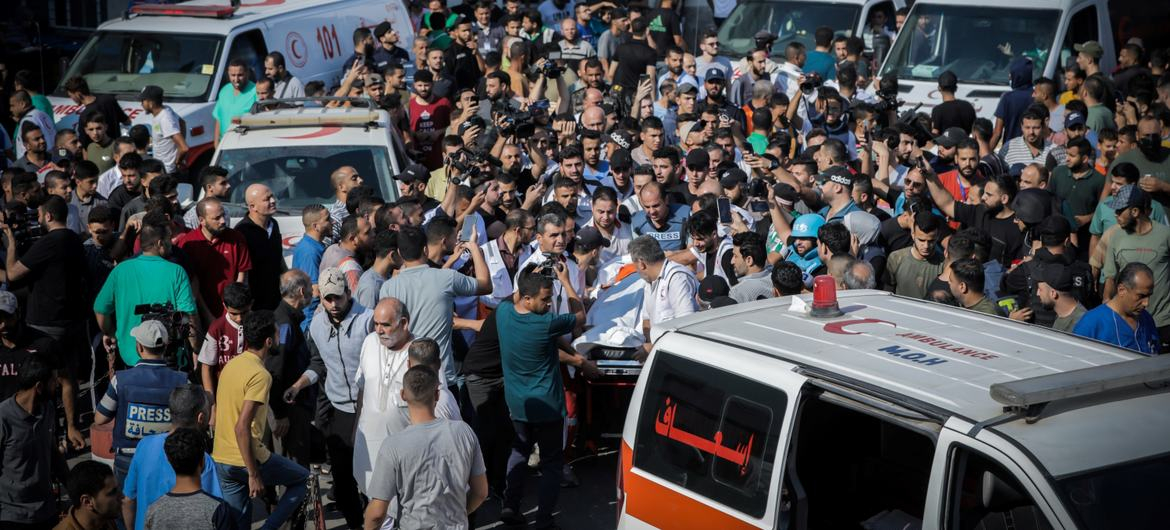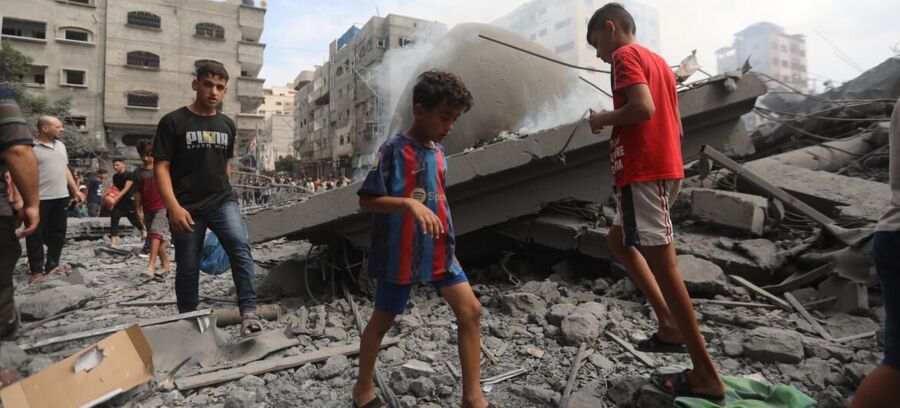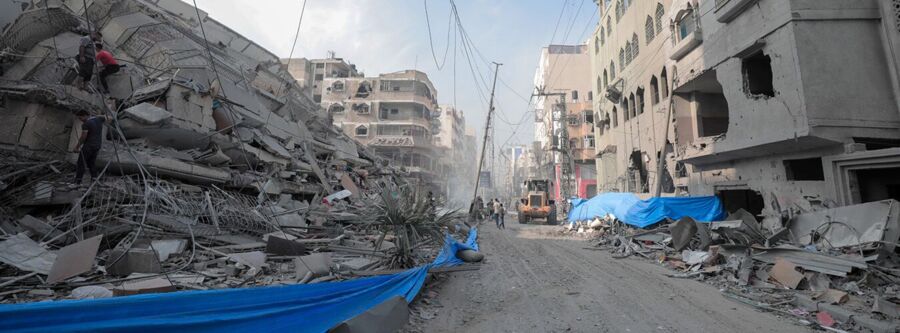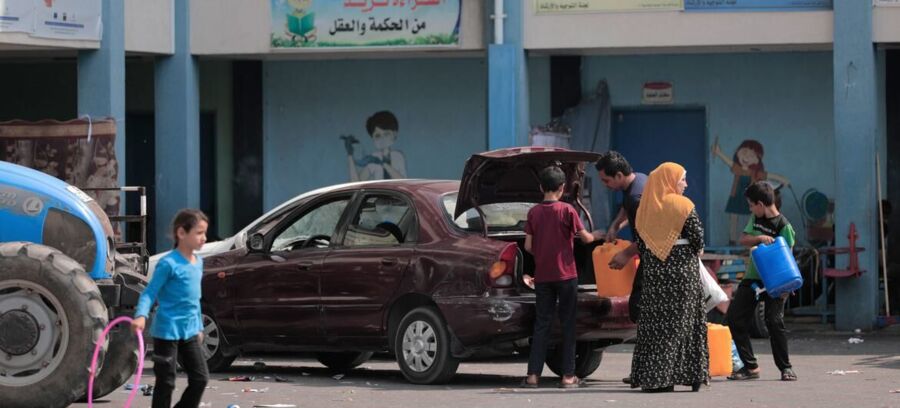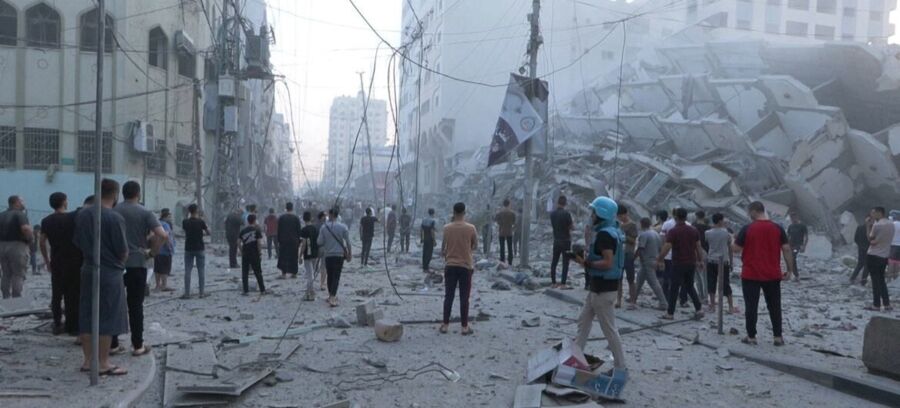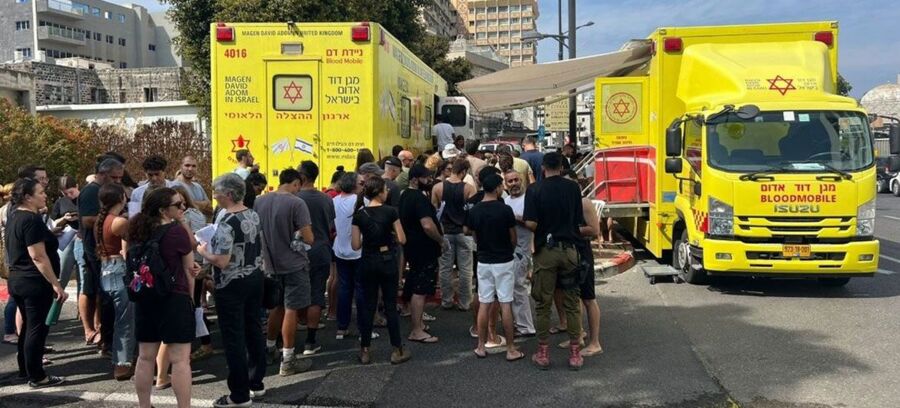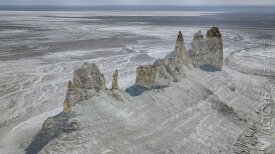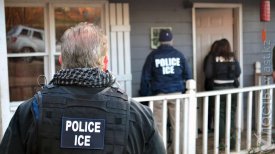Rockets and airstrikes reheated the decades-long conflict between Israel and Palestine in recent days. Vlast takes stock of the ongoing events and the public reaction to the escalation of violence that is causing a massive death toll among civilians on both sides.
Key Points
- Hamas, an Islamic militant group, shelled parts of the Gaza Strip on October 7 with thousands of rockets and launched a blitz land offensive
- The Israeli government retaliated with force, through airstrikes and blockades.
- Decades of negotiations to try and solve the long-running conflict between Israel and Palestine have been quashed by a “regime of apartheid” against Palestinians, human rights advocates said.
- The Western reactions to the renewed conflict stand in contrast to the geopolitical position that the West has taken with regards to the Russian aggression in Ukraine.
Thousands of people have died among Palestinians and Israelis since October 7, when Hamas, the Islamic militant group in control of the Palestinian region, launched an attack on Israel, which retaliated through a war-like offensive.
Hamas militants attacked Israel with rockets and then entered its territory from the Gaza Strip, which has been under Israeli blockade for 15 years. Representatives of the Hamas movement cited Israel's recent storming of the Al-Aqsa Mosque, considered one of the three main shrines of Islam, as the reason for the attack. In addition, Hamas accuses Israel of holding thousands of Palestinian prisoners.
The Israeli government declared “martial law” and created a wartime cabinet to supervise the retaliation against the brutal weekend assault.
Saturday's attack took place during the Jewish holiday of Simchat Torah, and 50 years after the Yom Kippur War of 1973, when Egyptian and Syrian troops moved to retake territory Israel captured during a brief attack in 1967.
A Bloodshed for Civilians
A UN report from October 11 warned of the critical situation in the region, especially for what concerns civilians. More than 400,000 people from Gaza, around 15% of the population, have been displaced as of October 12, according to the UN Agency for Palestine Refugees.
On October 13, Israel ordered the evacuation of more than a million residents of the Gaza Strip from the northern part of the enclave to the south within 24 hours, which the Israeli Prime Minister promised to “crush.” The UN condemned the order as “a crime against humanity and a flagrant violation of international humanitarian law” and demanded that it be rescinded.
“We are horrified at the prospect of an additional 1 million Palestinians joining the over 423,000 people already forcibly driven from their homes by the violence over the past week,” said Paula Gaviria Betancour, special rapporteur on refugee rights.
Pratibha Thaker, the Economist Intelligence Unit’s editorial director for the Middle East & Africa, said that the multi-pronged attack by Hamas has sparked a firm reaction from the Israeli government.
“We believe Israel will win a quick military victory after declaring a state of war and calling up thousands of reservists,” Thaker said in an interview with Vlast.
A quick victory, however, may not be synonymous with a conclusive solution, Thaker argued.
“The timeline for an Israeli-Arab peace deal will become more protracted, given that Israeli reprisals against Gaza are set to be severe.”
In a televised address, Israeli prime minister Benjamin Netanyahu said the plan is to “crush and destroy” Hamas.
“Every Hamas member is a dead man,” Netanyahu said.
Omar Shakir, Israel and Palestine director at Human Rights Watch (HRW), said in a note that the climate of “unlawful attacks and systematic repression” is likely to take a toll on civilians.
“If we’ve learned anything through prior escalations, it is that so long as there is impunity for serious abuses, we will continue to see more repression and shedding of civilian blood,” Shakir said.
Doctors in Gaza say that casualties among civilians have skyrocketed because Israel has carried out airstrikes without warning.
UN Secretary-General Antonio Guterres said the Gaza Strip's health system is “on the brink of collapse,” with hospitals unable to accept new patients and morgues overcrowded.
Plestia Alaqad, a journalist in Gaza who is also covering the conflict through her instagram page, said in one of her videos that even the increasingly late warnings are not enough for people to evacuate.
“Everyone living in Gaza is receiving emergency calls saying they have three minutes to evacuate. Sometimes you don't even get them. But where? There are no taxis anywhere, all the streets are destroyed,” Alaqad said.
Miriam Marmur, a spokeswoman for Gisha, an Israeli human rights group, told ABC News that the retaliation has wrought “an unprecedented scope of destruction”.
“Israeli decisions to cut electricity, fuel, food, and medicine supplies severely compound the risks to Palestinians and threaten to greatly increase the toll in human life,” Marmur said.
Meanwhile, Al-Shifa, Gaza’s biggest hospital, only holds enough fuel to keep power on for three days, Matthias Kannes, of Doctors Without Borders, told AP. Other hospitals are running out of surgical equipment, antibiotics, fuel, and other supplies.
Five days into the conflict, Alaqad said the situation was getting worse.
“We cannot understand anything. We cannot cover the events because everything is destroyed. Palestinian civilian forces and ambulances cannot reach the sites [that suffered airstrikes],” Alaqad said.
On October 12, however, Israel’s energy minister Israel Katz said via Twitter that the blockade of Gaza is unlikely to stop, until Hamas allows Israeli captives to have a safe passage.
From Catastrophe to Apartheid
The Israeli-Palestinian conflict’s history is long. For the Palestinian side, the starting point is often fixated in 1948, the Nakba (from Arabic “catastrophe”), the mass displacement and dispossession of Palestinians during the 1948 Arab-Israeli war. The HRW report accuses Israel of “crimes against humanity” and apartheid against the Palestinian population, and the UN has held since 1967 that Israel has illegally occupied Palestinian territory, including Jerusalem, which Israel has declared its capital.
After 1948, relations between Palestine and Israel went through a series of armed conflicts and negotiations. In the aftermath of the 1967 war, Israel completely occupied the territories of Palestine. The systematic violations of Palestinian rights led to a massive uprising (Intifada) in 1987, which resulted in the Oslo Accords in 1993, which gave legitimacy to the Palestinian National Liberation Movement (Fatah) over the more violent Hamas faction
According to the Oslo document, both sides recognize the right to their own states. Israel would maintain military control over the West Bank and Gaza Strip, while scattered Palestinian enclaves would progressively gain autonomy, with a promise of "future statehood" within five years. Three decades and several conflicts after Oslo, however, the parties failed to reach an agreement. The ultimate consequence was, according to Israeli historian Ilan Pappé, the occupation of Palestinian territories.
Fathi Nemer, a fellow at Al-Shabaka, which defines itself as the only independent, transnational Palestinian think tank, said the Gaza Strip enclave is far from being a haven for terrorists. Nemer prefers to define it as “a ghetto, or even a concentration camp”.
“The Palestinians in the Gaza Strip are overwhelmingly refugees who are denied a return to their homes by Israel in contravention of international law, simply for not being Jewish. Under the racist Israeli Law of Return, any Jewish person in the world is allowed to settle in Israel, but Palestinian refugees who still have their land deeds and keys are barred from returning,” Nemer told Vlast in an email.
In a 2021 report, HRW said that since 1967, Israeli authorities have facilitated the resettlement of Jewish Israelis in Palestine and given them a higher legal status than Palestinians. The Palestinians have a limited degree of self-rule in some parts of their territory, while Israel retains primary control over borders, airspace, the movement of people and goods, and registration of the entire population.
In the West Bank, HRW says Israel is creating a regime of "apartheid" by barring Palestinians from entering some settlements. The authorities confiscated more than a third of the territory there, and allocated most of it for Israeli citizens. Since 2009, Israel has resettled more than 500,000 Israelis in the West Bank.
“The increase in the number of settlers is the result of Israeli government policies that do not believe in the two-state solution,” said Nabil Abu Rudeineh, a spokesman for Palestinian Authority President Mahmoud Abbas. “All settlements are illegal,” he added.
Moreover, Israel maintained a blockade of the Gaza Strip, only allowing limited access to basic services, and crippled the local economy. About 80% of the local population has become dependent on humanitarian aid, and households in Gaza have to cope without centralized electricity for 12 to 20 hours a day. The UN also estimates that more than 96% of Gaza's water reserves are unfit for consumption.
In addition, the HRW report described how Israeli authorities frequently used repressive means during fighting and protests in the Gaza Strip. These offensives included deliberate attacks on civilians and civilian infrastructure, resulting in more than 2,000 civilian deaths. Israeli airstrikes in retaliation to the October attacks by Hamas flattened mosques in Gaza “over the heads of worshipers,” wrote The New York Times. Attacks against mosques in the Gaza Strip had happened regularly, most recently in mid-September.
Israel, in turn, in response to accusations of occupation, believes that these lands are “disputed.” Israeli governments continue to maintain the position that Jerusalem, “indivisible,” is the capital of Israel. In 2018, the country’s parliament adopted a law with constitutional status designating Israel as “the national state of the Jewish people” and that the right to self-determination in Israel “belongs to the Jewish people.”
“The Palestinians in the Gaza Strip are overwhelmingly refugees who are denied a return to their homes by Israel in contravention of international law, simply for not being Jewish. Under the racist Israeli Law of Return, any Jewish person in the world is allowed to settle in Israel, but Palestinian refugees who still have their land deeds and keys are barred from returning,” Nemer said.
According to the UN General Assembly 3236 resolution (1974), the Palestinian people have the right to self-determination as well as the right to national independence and sovereignty without external interference.
Double Standards
In 2018, three years before the HRW report, the Israeli government had revoked the work visa of Omar Shakir, HRW’s Israel and Palestine director, sparking criticism from the UN.
UK newspaper The Guardian reported earlier this year that in April 2022 Harvard University had withdrawn the offer of a senior fellowship to Kenneth Roth, a former head of HRW, in mid-2022 (a decision that the dean of the Kennedy School, Douglas Elmendorf, reversed a few months later). In the interview, Roth argued that the Harvard dean “bowed to pressure from donors who are strong supporters of Israel,” and who strongly criticized the HRW report of a year before.
Just as Roth was being shunned at Harvard, another report by human rights advocates at Amnesty International also likened the Israeli government policy to apartheid.
“Israel imposes a system of oppression and domination against Palestinians across all areas under its control. [...] This amounts to apartheid as prohibited in international law.”
Nemer argues that the international community’s reaction has applied a different degree of indignation towards the Israeli-Palestinian conflict, compared to the widespread uproar towards Russia’s invasion of Ukraine.
“Palestinians have used every method under the sun to resist their colonization. Both violent and non-violent tactics, without exception, have been demonized and rejected by the so-called international community. This stands in stark contrast to the way the world reacted to the Russian invasion of Ukraine. Russia was clearly designated as an occupying force, and international efforts were taken not only to boycott Russia, but even to arm Ukraine. We saw unprecedented media campaigns declaring solidarity with Ukrainians.”
Just days after the attack by Hamas, the US sent a first batch of military aid to Israel.
In an email to Vlast, the Economist Intelligence Unit’s Europe team said the geopolitical positions of the great powers towards these two conflicts are unlikely to change.
“EU aid to the Palestinian territories will now receive increased scrutiny. However, Western funding agreements in support of Ukraine will remain in place, and future US support is unlikely to be affected by the competing needs of Israel, since the two are considered separately.”
Nemer, at the Al-Shabaka think tank, noted the double standard in such approaches.
“Here we witness a cynical double speak. This also applies to the media who were supportive of every act of Ukrainian resistance. In the Palestinian case, there is complete support for the Israeli narrative without any critical reflection. As Israel is bombing Gaza indiscriminately, killing hundreds of Palestinian civilians, we see none of the humanity or sympathy reserved for Israelis or Ukrainians,” Nemer said.
A solution, Palestinians say, would be to rightfully restore a decolonized, sovereign state, free from occupation.
“A decolonized land between the river and the sea, where refugees can return to their homes freely and salvage the future that was hijacked from them. The borders that were imposed on us do not do justice to the idea of liberation and are aimed at protecting artificial Israeli demographics. Without justice, there can be no true liberation. Without addressing the Nakba, there can be no justice,” Nemer concluded.
Поддержите журналистику, которой доверяют.
